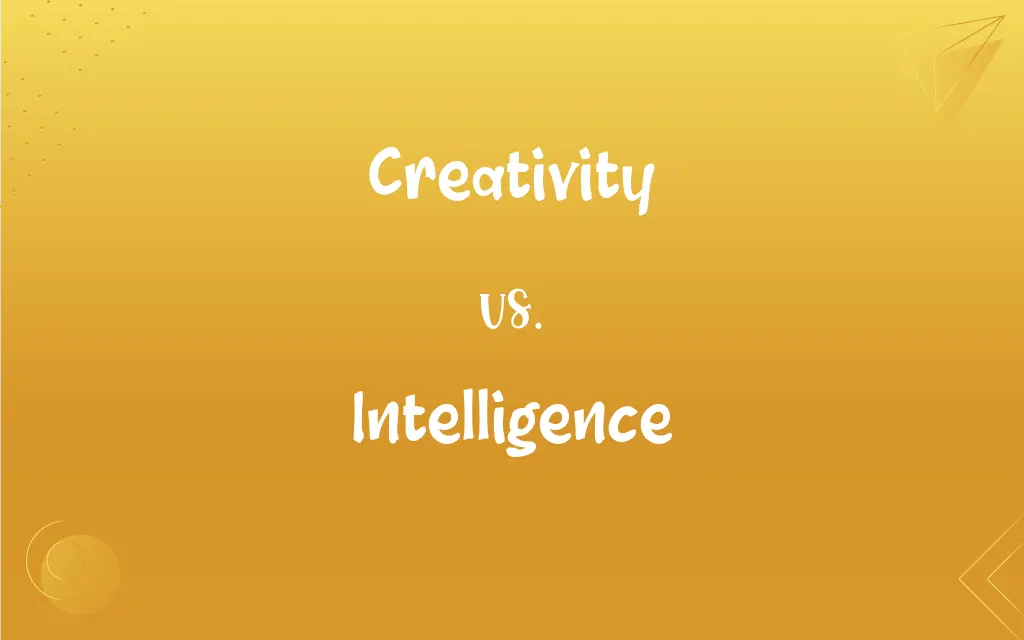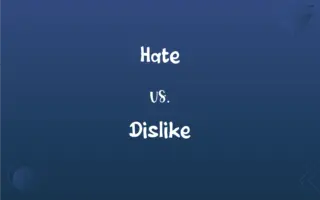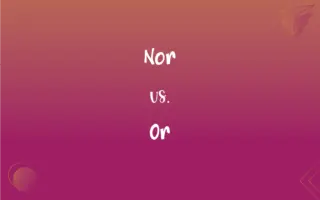Creativity vs. Intelligence: What's the Difference?
Edited by Aimie Carlson || By Harlon Moss || Updated on October 6, 2023
Creativity is the use of imagination or original ideas to create something. Intelligence is the ability to acquire and apply knowledge and skills.

Key Differences
Creativity and Intelligence are often intertwined yet maintain distinct qualities. Creativity commonly involves generating novel and useful ideas, embracing originality and innovation. In contrast, intelligence typically refers to the ability to learn, understand, and apply knowledge, often measured through IQ tests or similar assessments.
Creativity is often demonstrated through artistic, innovative, or unorthodox solutions and ideas. It’s a boundless, non-linear form of thinking. Intelligence, meanwhile, may be exhibited through problem-solving, logical reasoning, and the ability to grasp and apply knowledge, which is more structured and may adhere to linear thinking and existing information.
Both creativity and intelligence are deemed crucial in various aspects of life and can significantly influence one's ability to navigate various challenges. While creativity sparks new ideas and methods, intelligence aids in effectively utilizing and applying available information and experiences.
Although creativity often involves thinking outside the box and generating original ideas, intelligence might not always involve original thinking but does include the application and perhaps the adaptation of existing knowledge to various contexts and situations.
Creativity and intelligence, while distinctive, often complement each other. A highly intelligent individual might leverage their creativity to devise innovative solutions, whereas a highly creative individual often utilizes their intelligence to apply their inventive ideas effectively.
ADVERTISEMENT
Comparison Chart
Definition
Involves original and innovative thinking.
Involves acquiring, understanding, and applying knowledge.
Measurement
Hard to quantify; assessed through innovative outputs.
Often measured with IQ tests or cognitive assessments.
Application
Applied in generating new ideas and solutions.
Applied in problem-solving using existing knowledge.
Associated Thinking
Typically associated with divergent thinking.
Often associated with convergent thinking.
In Practice
May result in novel arts, ideas, or inventions.
May be seen in logical reasoning and learned skills.
ADVERTISEMENT
Creativity and Intelligence Definitions
Creativity
The knack for inventing or concocting.
Her creativity was evident through her unique paintings.
Intelligence
The capacity for learning, reasoning, and understanding.
His intelligence was evident in quickly solving complex puzzles.
Creativity
The capability to think and create unconventionally.
Creativity led her to develop a novel, sustainable energy solution.
Intelligence
Aptitude in absorbing and applying knowledge.
Her intelligence enabled her to master multiple languages.
Creativity
An ability to envision and produce original ideas.
His creativity fashioned a groundbreaking technological device.
Intelligence
Competency in acquiring and using knowledge.
Her intelligence facilitated the seamless learning of new skills.
Creativity
The faculty of forming new concepts.
Her creativity revolutionized traditional culinary methods.
Intelligence
Ability to solve problems and adapt to situations.
Through his intelligence, he found solutions to critical issues.
Creativity
The flair to imagine beyond the ordinary.
With sheer creativity, he transformed junk into art.
Intelligence
The skill to perceive and comprehend meanings.
His intelligence was reflected in discerning abstract concepts.
Creativity
Having the ability or power to create
Human beings are creative animals.
Intelligence
The ability to acquire, understand, and use knowledge
A person of extraordinary intelligence.
Creativity
Productive; creating.
Intelligence
Information, especially secret information gathered about an actual or potential enemy or adversary.
Creativity
Characterized by originality and expressiveness; imaginative
Creative writing.
Intelligence
The gathering of such information
"Corporate intelligence relies on a slew of tools, some sophisticated, many quite basic" (Neil King and Jess Bravin).
FAQs
How is creativity commonly expressed?
Creativity is expressed through novel ideas, inventive solutions, and original artworks or designs.
Can someone be intelligent but not creative, and vice versa?
Absolutely, a person can be highly intelligent but not especially creative, and conversely, be highly creative without high intelligence.
Can intelligence be improved over time?
Yes, intelligence can be honed through continuous learning, problem-solving, and embracing new experiences.
Can creativity be measured similarly to intelligence?
Unlike intelligence, creativity is more challenging to quantify due to its abstract and subjective nature.
How do education systems nurture creativity?
Education systems may nurture creativity through open-ended projects, creative assignments, and encouraging innovative thinking.
Is intelligence solely genetic, or can it be nurtured?
Intelligence is influenced by both genetic and environmental factors, and can be nurtured through stimulating environments and experiences.
What are examples of creativity in science?
Creativity in science may involve developing new hypotheses, innovative research methods, or inventing new technologies.
How do creativity and intelligence intersect in artistic fields?
In artistic fields, creativity generates original ideas, while intelligence helps in effectively implementing these ideas and perhaps mastering techniques.
Can animals exhibit creativity and intelligence?
Yes, numerous animal species exhibit signs of creativity and intelligence, often through problem-solving, tool use, and communication strategies.
Is emotional intelligence related to cognitive intelligence?
While related, emotional intelligence (understanding and managing emotions) and cognitive intelligence (problem-solving, learning) are different aspects.
How can a workplace foster creativity among its employees?
Workplaces can foster creativity by encouraging new ideas, providing time for creative thinking, and recognizing innovative efforts.
Can intelligence tests accurately measure all aspects of intelligence?
No, intelligence tests typically measure specific aspects like logical reasoning and knowledge application, but not all forms of intelligence, like emotional or creative intelligence.
Is creativity vital for leadership roles?
Yes, creativity is often crucial for leadership to navigate challenges, inspire teams, and devise innovative strategies.
What roles does creativity play in technology development?
Creativity drives technology development by inspiring new inventions, software, and solutions to technical challenges.
How can intelligence be applied in everyday life?
Intelligence is applied daily in problem-solving, making informed decisions, and effectively learning and adapting to new information.
Are there specific jobs that require high creativity but not high intelligence, or vice versa?
Some jobs might prioritize one over the other, like certain artistic roles valuing high creativity, while data analysis might prioritize intelligence.
Are creativity and intelligence correlated?
While they can influence each other, creativity and intelligence are distinct and can exist independently.
How does creativity manifest in problem-solving?
Creativity in problem-solving involves finding novel, effective solutions, and possibly perceiving the problem in new, insightful ways.
Can high intelligence ever be a hindrance?
In certain scenarios, high intelligence might lead to overthinking or social isolation, but it’s generally considered beneficial.
Can creativity be learned or enhanced?
Yes, creativity can be enhanced by embracing new experiences, practicing thinking outside the box, and engaging in creative activities.
About Author
Written by
Harlon MossHarlon is a seasoned quality moderator and accomplished content writer for Difference Wiki. An alumnus of the prestigious University of California, he earned his degree in Computer Science. Leveraging his academic background, Harlon brings a meticulous and informed perspective to his work, ensuring content accuracy and excellence.
Edited by
Aimie CarlsonAimie Carlson, holding a master's degree in English literature, is a fervent English language enthusiast. She lends her writing talents to Difference Wiki, a prominent website that specializes in comparisons, offering readers insightful analyses that both captivate and inform.
































































